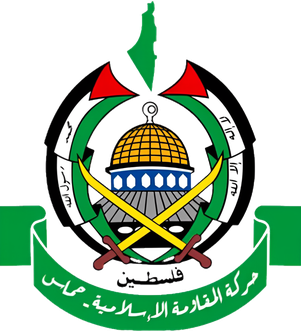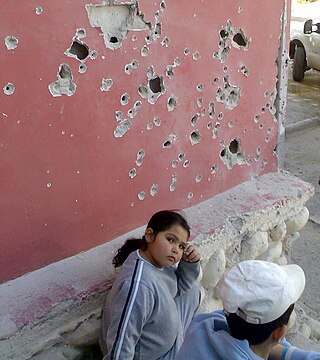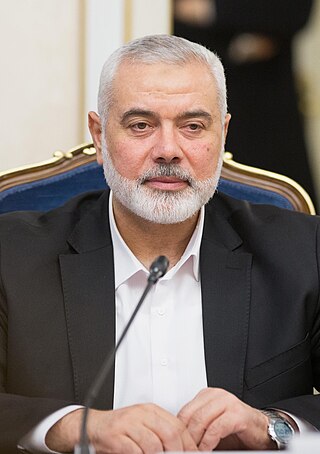
The Gaza Strip, or simply Gaza, is a polity and the smaller of the two Palestinian territories. On the eastern coast of the Mediterranean Sea, Gaza is bordered by Egypt on the southwest and Israel on the east and north.

Hamas, an acronym of its official name, Harakat al-Muqawama al-Islamiya, is a Palestinian Sunni Islamist political and military movement governing parts of the Israeli-occupied Gaza Strip.

The Palestinian National Authority, commonly known as the Palestinian Authority and officially the State of Palestine, is the Fatah-controlled government body that exercises partial civil control over West Bank areas "A" and "B" as a consequence of the 1993–1995 Oslo Accords. The Palestinian Authority controlled the Gaza Strip prior to the Palestinian elections of 2006 and the subsequent Gaza conflict between the Fatah and Hamas parties, when it lost control to Hamas; the PA continues to claim the Gaza Strip, although Hamas exercises de facto control. Since January 2013, the Palestinian Authority has used the name "State of Palestine" on official documents, although the United Nations continues to recognize the Palestinian Liberation Organization (PLO) as the "representative of the Palestinian people".

Palestinian political violence refers to actions carried out by Palestinians with the intent to achieve political objectives that can involve the use of force, some of which are considered acts of terror, and often carried out in the context of the Israeli–Palestinian conflict and the Israeli occupation. Common objectives of political violence by Palestinian groups include self-determination in and sovereignty over Palestine, or the "liberation of Palestine" and recognition of a Palestinian state, either in place of both Israel and the Palestinian territories, or solely in the Palestinian territories. This includes the objective of ending the Israeli occupation. More limited goals include the release of Palestinian prisoners or the Palestinian right of return.

The state of human rights in the West Bank and Gaza Strip is determined by Palestinian as well as Israeli policies, which affect Palestinians in the occupied Palestinian territories both directly and indirectly, through their influence over the Palestinian Authority (PA). Based on The Economist Democracy Index this state is classified as an authoritarian regime.

According to the Israel Police, the general crime rate dropped in 2020, while cyber crimes, domestic violence and sexual abuse incidents rose.

Homosexuality in the Palestinian territories is considered a taboo subject; lesbian, gay, bisexual, and transgender (LGBT) people experience persecution and violence. There is a significant legal divide between the West Bank and the Gaza Strip, with the former having more progressive laws and the latter having more conservative laws. Shortly after the Jordanian annexation of the West Bank in 1950, same-sex acts were decriminalized across the territory with the adoption of the Jordanian Penal Code of 1951. In the Egyptian-occupied Gaza Strip and under Hamas' rule, however, no such initiative was implemented.

Children and Children's rights have long been a focal point of the ongoing Israeli-Palestinian conflict, dating as early as the 1929 Hebron massacre and the 1948 Deir Yassin massacre, both of which claimed the lives of children, precipitating a long conflict that has often led to the displacement, injury, and death of youths. Youth exposure to hostilities increased notably during the First and Second Intifada, where harsh responses from Israeli forces towards Palestinian adolescents and children protesting the Israeli occupation led to the arrest and detention of many Palestinian youth, in addition to other human rights abuses.

The Battle of Gaza was a military conflict between Fatah and Hamas that took place in the Gaza Strip from 10 to 15 June 2007. It was a prominent event in the Fatah–Hamas conflict, centered on the struggle for power after Fatah lost the 2006 Palestinian legislative election. The battle resulted in the dissolution of the unity government and the de facto division of the Palestinian territories into two entities: the West Bank governed by the Palestinian National Authority (PNA), and the Gaza Strip governed by Hamas. Hamas fighters took control of the Gaza Strip, while Fatah officials were either taken as prisoners, executed, or expelled. The Palestinian Centre for Human Rights reported that at least 161 people were killed and more than 700 were wounded during the fighting.

Ismail Haniyeh is a Palestinian politician who is seen as the overall political leader of Hamas, the de facto ruling entity of the Gaza Strip. He is the current chairman of Hamas’s political bureau; as of 2023, Haniyeh lives in Qatar.

The 2014 Gaza War, also known as Operation Protective Edge, and Battle of the Withered Grain, was a military operation launched by Israel on 8 July 2014 in the Gaza Strip, a Palestinian territory that has been governed by Hamas since 2007. Following the kidnapping and murder of three Israeli teenagers in the West Bank by Hamas-affiliated Palestinian militants, the Israel Defense Forces (IDF) initiated Operation Brother's Keeper, in which some 350 Palestinians, including nearly all of the active Hamas militants in the West Bank, were arrested. Hamas subsequently fired a greater number of rockets into Israel from the Gaza Strip, triggering a seven-week-long conflict between the two sides. It was one of the deadliest outbreaks of open conflict between Israel and the Palestinians in decades. The combination of Palestinian rocket attacks and Israeli airstrikes resulted in over two thousand deaths, the vast majority of which were Gazan Palestinians. This includes a total of six Israeli civilians who were killed as a result of the conflict.

The Palestinian Security Services (PSS) are the armed forces and intelligence agencies of the State of Palestine. They comprise several institutions, notably the Security Forces and the Police. The President of the Palestinian National Authority is Commander-in-Chief of the Palestinian Forces.
Capital punishment in the Gaza Strip has been practiced by the Hamas Administration since it assumed power in 2007. The punishment is given for offenses such as crimes against Islamic law, land sales to Israelis, and treason. The Hamas administration of the Gaza Strip inherited the Palestinian National Authority code of law, which included the death penalty for several kinds of offenses, but while the Palestinian administration in Ramallah has refrained from executing capital punishments, death sentences are periodically performed by Hamas.
Israeli torture in the occupied territories refers to the use of torture and systematic degrading practices on Palestinians detained by Israeli forces in both the West Bank and Gaza Strip. The practice, routine for decades, was eventually reviewed by the Supreme Court of Israel in 1999, which found that "coercive interrogation" of Palestinians had been widespread, and deemed it unlawful, though permissible in certain cases. Torture is also practiced by the Palestinian authorities in the West Bank and the Gaza Strip.
The death of Israa Ghrayeb took place on 22 August 2019 in the Palestinian city of Bethlehem. Israa Ghrayeb, a 21-year-old Muslim make-up artist, was beaten to death in an "honor killing" because she posted a selfie with her fiance a day before they were supposed to get engaged. Her family has denied the accusation, saying that instead she died of a heart attack.

The Prosecutor of the International Criminal Court (ICC), Fatou Bensouda, on 20 December 2019 announced an investigation into war crimes allegedly committed in Palestine by Israeli personnel or members of Hamas and other Palestinian armed groups since 13 June 2014. The allegations include the establishing of illegal West Bank settlements and violations of the law of war by personnel of the Israeli Defence Forces during the 2014 Gaza War, including claims of targeting Red Cross installations. Members of armed Palestinian organizations, including Hamas, were accused of deliberately attacking Israeli civilians and using Palestinians as human shields. Israel is not a member of the ICC and disputes its jurisdiction on the basis that Palestine is not a sovereign state capable of being a party to the Rome Statute, and Israeli Prime Minister Benjamin Netanyahu repeatedly condemned the allegations and investigation. According to ICC chief prosecutor Karim Ahmad Khan, suspected war crimes by Israelis on Palestinian territory and by Palestinians on Israeli territory during the 2023 Israel–Hamas war are within the jurisdiction of the Palestine investigation.
Torture in the State of Palestine refers to the use of torture and systematic degrading practices on civilians detained by Palestinian forces in the West Bank and the Gaza Strip. As of 2018, Amnesty reported that LGBT people were subjected to arbitrary arrest and ill-treatment.
Events in 2023 in the Palestinian territories.

Since the outbreak of the Israel–Hamas war on October 7, 2023, Israel has carried out mass arrests and detentions of Palestinians. Thousands have been arrested in the Israeli-occupied Palestinian territories and in Israel, based on alleged militant activity, offensive social media postings, or arbitrarily.

During the Israel–Hamas war, the systematic torture of Palestinians by Israel was reported by the United Nations, Human Rights Watch, Amnesty International, and several Israeli nonprofit organizations. Israel was accused of sexual violence against both male and female Palestinian detainees, as well as torturing United Nations staff in order to extract forced confessions. There were further reports of the Israeli torture of accused militants. In response, Shin Bet officials stated they conduct militant interrogations within the Israeli legal framework, which allows torture only under specific circumstances.













